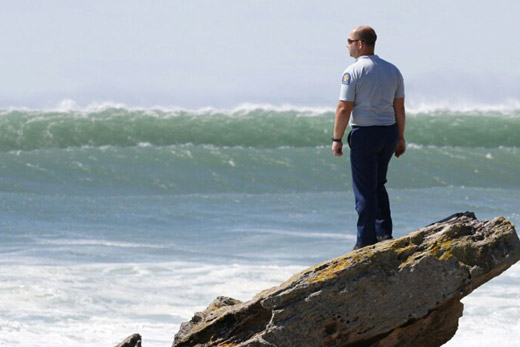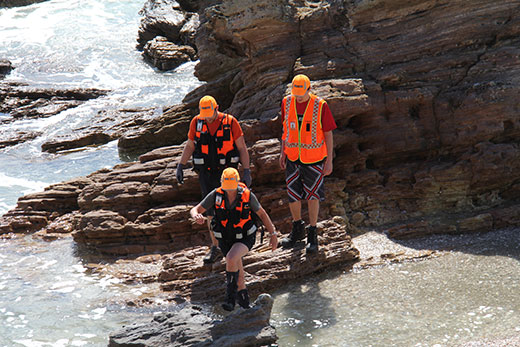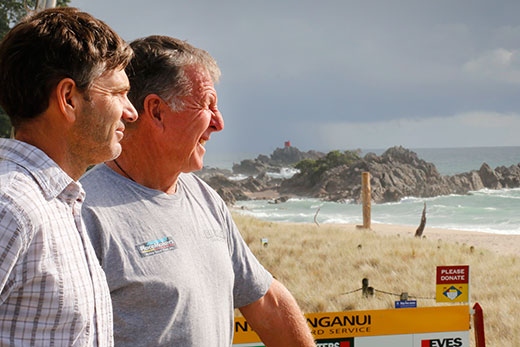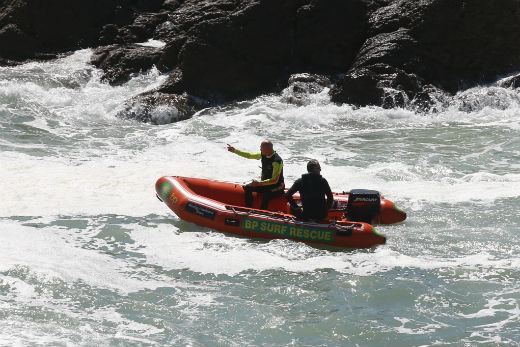Their professional search and rescue efforts are being praised with a national award, but for the Mount Maunganui lifeguard community, an underlying sense of unfinished business runs deep following the Jack Dixon tragedy.
Nearly seven months after the five-year-old was swept out to sea, the Mount Maunganui Lifeguard Service has been awarded a New Zealand Search and Rescue certificate of achievement (operational activity) for their important contribution during 2014.
Mount Maunganui Lifeguard Service's general manager Glenn Bradley (left) and senior lifeguard Kent Jarman at Mount Main Beach. Photos: Bruce Barnard & Tracy Hardy.
And while it is an accolade the club is proud to receive, it was earned in the kind of situation it hopes to never have to be involved in.
'The one thing that the club can take from that is somebody external from the situation and the emotion is recognising the way we responded and they believe that worthy of recognition,” says Mount Maunganui Lifeguard Service general manager Glenn Bradley.
On October 1, Jack and his extended family were enjoying the start of school holidays when a large wave swept him and two girls, sisters aged 12 and 14, out to sea as they played in an area at the base of Mauao known as Shelly Beach.
The two girls managed to get to a nearby rock before being helped to shore by two adults.
But Jack disappeared from view, and what ensued gripped the nation as lifeguards, police and the wider community searched tirelessly to try and locate the little boy. But to no avail.
Sitting down with SunLive to discuss the award and to recount the ordeal's emotional and physical toll, Glenn and senior lifeguard Kent Jarman admit the sheer size and scale of operation was something the club had never before encountered.
The pair recall the treacherous nature of the sea that day that had lifeguards on edge. Kent and another member had already pulled a surfer out of the water at about 10am – the first of seven rescues involving surfers that day.
'I made a rather prophetic statement when we were bringing in that guy in the IRB,” admits Kent. 'I said to Peter, who had come out with me, ‘don't put the IRB away - we haven't finished'. I just looked at the conditions and the day.
'You just get a feel for it and that pretty much summed up the day. We did seven more rescues of surfers that day and if it hadn't been for the increased presence of lifeguards and IRBs for the search, we would have lost one more that day - I can guarantee it.”
Less than 10 minutes after the call to report Jack had been swept away, the club's lifeguards responded in treacherous conditions on the water and on the base track.
They initiated the first round of searches and laid the foundations for a resolute lifeguard presence in the days to come.
Whether it was providing support on the water alongside police and coastguard, or working with land search and rescue teams on the rocks, the club was a vital piece of the search and rescue jigsaw.
Around 1500 volunteer hours of searching were logged by the club, with 20-to-30 people per day involved for the first seven days of the operation.
Yet like the rest of the nation, the search tugged at the club's heart strings – particularly as they were unable to bring closure to the family. But both men agree there is nothing more the club could have done under the circumstances.
'When we look back at it analytically, we realise the situation and how it was in that instant when Jack was taken,” says Glenn.
'The fact that he was never seen again and with the conditions the way they were, I guess we can console ourselves with the fact that there is absolutely nothing else we could have done to change the outcome.
'Looking back at the response of the search, we can hold our head high and truly believe we gave ourselves and the family every chance to find the boy even within those first couple of hours.”
For Kent, it is one of the hardest moments in his 48-years of patrolling beaches.

At the time he remembers telling lifeguards at the end of day one of the need to put their emotions aside, by 'compartmentalising it in a little box” and focussing on what they are trained to do.
But even for a clubbie nearing half a century of service, it was a hard-hitting day and one he has reflected on for countless hours since.
'I guess it is quite stressful, but you don't think of it at the time,” admits Kent. 'For me, the biggest stress personally was that it was unresolved and we worked bloody hard to get a result.
'Unfortunately that didn't happen, but it wasn't for lack of trying.”
Reflecting on the award, Glenn says the club can take pride in the fact that in times of real need, the response it provides is first class. The way Mount lifeguards, along with those from Omanu and Papamoa, came together and contributed throughout the search proved that.
He adds the assistance and support from the wider community through the period was also overwhelming.
The club would like to thank the Omanu and Papamoa Surf Lifesaving Club's for the support it received during this large-scale operation.
The award will presented by Governor General Sir Jerry Mateparae at the 2014 New Zealand Search and Rescue Council Awards held at Government House, Wellington on Tuesday evening.
The awards are presented annually in recognition of outstanding achievements in Search and Rescue nationwide.





0 comments
Leave a Comment
You must be logged in to make a comment.